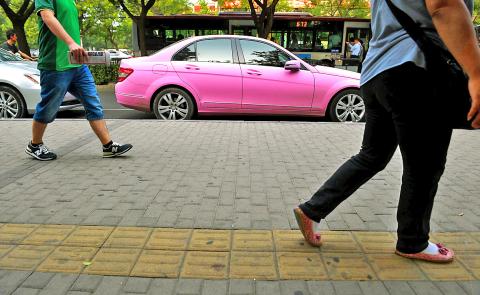China announced yesterday it would fine 12 Japanese auto parts suppliers a total of US$202 million for colluding to raise prices in an unfolding anti-monopoly probe of the country’s auto industry.
Beijing has launched a series of investigations into automakers and technology suppliers under its six-year-old anti-monopoly law, in an apparent effort to force down prices. Officials said earlier that Mercedes-Benz, Audi and Chrysler also violated the law.
The Japanese suppliers were found to have colluded improperly, some for up to 10 years, to raise prices of ball bearings and other parts, according to China’s National Development and Reform Commission.

Photo: AFP
“This harmed the legitimate rights and interests of consumers,” the commission said on its Web site.
PRICE COMPLAINTS
Regulators have given few details of the probe but industry analysts say they might have been motivated by complaints about the high price of imported luxury vehicles and replacement parts.
Two of the Japanese companies, ball bearing makers NSK Ltd and NTN Corp, announced on Tuesday they were among those being fined.
The others were components suppliers Hitachi Ltd, Denso Corp, Aisan Industry Co, Mitsubishi Electric Corp, Mitsuba Corp, Yazaki Corp and Furukawa Corp and bearings makers Nachi-Fujikoshi Corp and JTEKT Corp.
The commission said that the components makers were fined a total of 832 million yuan (US$136 million) and the bearings suppliers 403 million yuan, but it gave no breakdown by company.
COMPETITION LAW
The EU Chamber of Commerce in China, in a statement last week, said competition law should not be used to achieve other goals such as forcing price reductions.
The group said that it received reports regulators pressure companies to accept penalties without a full hearing and avoid involving their governments.
A Chinese Ministry of Commerce spokesman denied this week that foreign companies were treated unfairly.
On Monday, the government said Mercedes Benz was guilty of “vertical price-fixing.” It said the unit of Germany’s Daimler AG used its control over supplies of replacement parts to charge excessive prices.
Officials have said Volkswagen AG’s Audi luxury unit and Fiat Chrysler Automobile NV’s Chrysler would also face unspecified punishment for violating the law. Toyota Motor Co has said its Lexus unit is under scrutiny.
TECH FIRMS PROBED
Regulators also have announced investigations of Qualcomm Inc and Microsoft Corp.
Last year, Chinese regulators fined five foreign dairies and one from Hong Kong a total of US$108 million on charges they violated the anti-monopoly law by setting minimum prices for their distributors.

PATENTS: MediaTek Inc said it would not comment on ongoing legal cases, but does not expect the legal action by Huawei to affect its business operations Smartphone integrated chips designer MediaTek Inc (聯發科) on Friday said that a lawsuit filed by Chinese smartphone brand Huawei Technologies Co (華為) over alleged patent infringements would have little impact on its operations. In an announcement posted on the Taiwan Stock Exchange, MediaTek said that it would not comment on an ongoing legal case. However, the company said that Huawei’s legal action would have little impact on its operations. MediaTek’s statement came after China-based PRIP Research said on Thursday that Huawei filed a lawsuit with a Chinese district court claiming that MediaTek infringed on its patents. The infringement mentioned in the lawsuit likely involved

Taipei is today suspending work, classes and its US$2.4 trillion stock market as Typhoon Gaemi approaches Taiwan with strong winds and heavy rain. The nation is not conducting securities, currency or fixed income trading, statements from its stock and currency exchanges said. Authorities had yesterday issued a warning that the storm could affect people on land and canceled some ship crossings and domestic flights. Taiwan Semiconductor Manufacturing Co (TSMC, 台積電) expects its local chipmaking fabs to maintain normal production, the company said in an e-mailed statement. The main chipmaker for Apple Inc and Nvidia Corp said it has activated routine typhoon alert

GROWTH: TSMC increased its projected revenue growth for this year to more than 25 percent, citing stronger-than-expected demand for AI devices and smartphones The Taiwan Institute of Economic Research (TIER, 台灣經濟研究院) yesterday raised its forecast for Taiwan’s GDP growth this year from 3.29 percent to 3.85 percent, as exports and private investment recovered faster than it predicted three months ago. The Taipei-based think tank also expects that Taiwan would see a 8.19 percent increase in exports this year, better than the 7.55 percent it projected in April, as US technology giants spent more money on artificial intelligence (AI) infrastructure and development. “There will be more AI servers going forward, but it remains to be seen if the momentum would extend to personal computers, smartphones and

Catastrophic computer outages caused by a software update from one company have once again exposed the dangers of global technological dependence on a handful of players, experts said on Friday. A flawed update sent out by the little-known security firm CrowdStrike Holdings Inc brought airlines, TV stations and myriad other aspects of daily life to a standstill. The outages affected companies or individuals that use CrowdStrike on the Microsoft Inc’s Windows platform. When they applied the update, the incompatible software crashed computers into a frozen state known as the “blue screen of death.” “Today CrowdStrike has become a household name, but not in